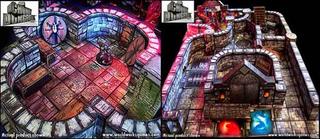In an earlier post on
Getting the Object of Your Affections to Appreciate Comic Books, it was briefly mentioned that the "post-modern deconstructive" nature of the representation of Superheroes in titles like
Watchmen and
The Dark Knight Returns are probably not the best way to bring new people into the comic book hobby.
The column had been written with the assumption that readers would have read the earlier post discussing
Comics and "Art". That article paraphrased a section of Roger Scuton's book
Modern Culture in an attempt to illustrate why modern comics sales are low. Even during an era where Spider-Man 2 the movie makes money hand over fist, the Spider-Man comic book title sells fewer than 100,000 copies a month. Why is this? That is the question Cinerati is continually trying to address. To follow up on the Scruton comparison, Cinerati's argument is essentially this.
"Our sympathy for the comic book superhero stems from the deepdown recognition that his predicament is ours. Precisely because we live in a morbidly unheroic world." We as comic book readers are looking for people who can behave heroically in a world gone mad. We are looking for people with "purer" motives than our own. If we look at Spider-Man's original origin, we find a character who initially makes the same decision we would make. We would decide to use our power for profit not virtue and damn the consequences. When faced with the inevitiable consequences of his own failings, the murder of his uncle Ben, Peter Parker rejects his base motiviations and adheres to a mantra. It is a powerful mantra indeed, "With great power comes great responsibility." From that point on the conflicts of Spider-Man's narrative are between desire and responsibility, and Peter relentlessly chooses responsibility. The consequences of forfeiting or surpressing desire are the loss of friends and social alienation, but failing to meet responsibilities leads to death. This is especially true in the early stories by Steve Ditko. Many of Spider-Man's villains are created because he temporarily chose desire over responsibility. It is only though responsible behavior for its own sake that Spider-Man historically received "peace."
The traditional Superhero, up through the early Marvel Era, was often a tragic and lonely figure, but it was also a distinctly
moral figure. Superman had his Fortress of Solitude, but even though he had the power to rule the world his primary motivation was to make contact with people and become a "normal man." Superman has no need for a secret identity save the fact that he desires to be a part of the City. Aristotle said that whoever "can live without the City is either a man or a god." Superman an exile from a once great people, who seems to have godlike power, shows us that the best and most powerful of men still require the City and its norms. Similar things can be said of Batman. He has his Batcave and a burning desire for vengeance. Yet he too maintains a social persona, one which strives more than anything to create a new "family."
The traditional Superhero narrative is not pure virtue for virtue's sake with the abandonment of the "real world," but Superheroes are those who exist both inside and outside of the real world. Spider-Man exists completely outside the City, but Peter Parker is a part of it. The same for Batman and Superman. The hero who can live fully within the City is rare, even the Fantastic Four don't quite qualify (especially the ever-lovin' blue eyed Thing).
But this historic narrative changed with sophisticated narratives like
Watchmen. In
Watchmen we are given a godlike figure who does in fact reject the City and in doing so becomes a beast. We have a moralist who is shown as a madman. While the tale makes for compelling and well written deconstruction it fails as foundation for continuing myth. "Society" had already, post-Nietzsche, killed God (and thus all appeals to moral authority). That was why society needed the artistic myth. The artistic myth is the morally redemptive force Mark Salzman focuses on in his book
Lying Awake which allows him to understand how compelling and powerful religion is for the faithful. But in the post-modern comic narrative we are given "the final rejection of high culture as a redemptive force and the ruination of the sacred in its last imagined form." There is nothing redemptive in
Watchmen, or in much of modern comics (read
The Ultimates and
The Ultimates 2) and this is why I think that comics are less appealing to audiences today than the movies based on them. The movies still maintain the "classic" elements, narrative techniques the comics have often abandoned.
Steve Bennett of ICV2 has written a wonderful article with his assessments of low comic readership. His central thesis is, "as currently written and drawn, the super-hero comic book is just too overwhelmingly dark to appeal to [the vast mass audience]." Please read the article.
Like Steve, Cinerati is not claiming that authors should return the writing techniques of some by gone age. Silver Age stories were simplistic and the move to more literary tales is a positive one. But like Steven, we would ask "Is this anyone's idea of
fun?"
As always Cinerati would appreciate your feedback regarding comics you think would bring new people into the wonderful world of comics.


